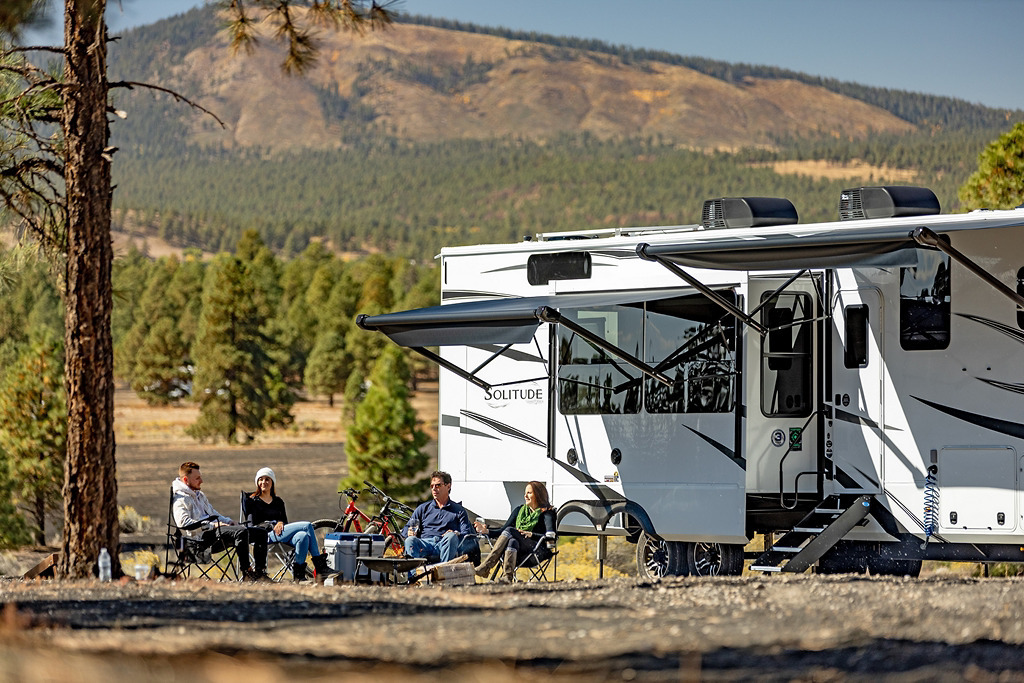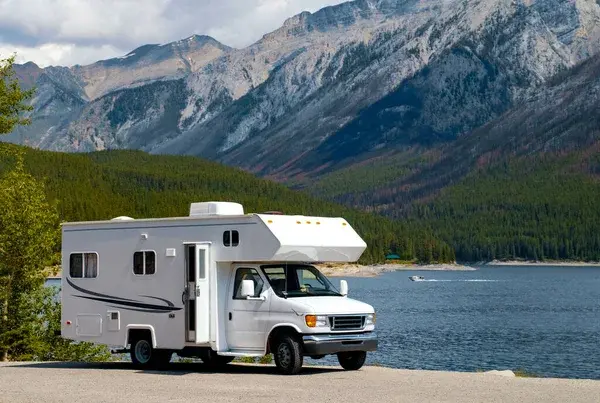Spring is the ideal time for RV travel, and it’s also the perfect opportunity to take advantage of new recreational vehicle tax deductions that could save you a significant amount.
With the weather warming up and summer adventures just around the corner, now’s the time to make sure you’re making the most of the perks available to RV owners.
Whether you’re planning family road trips, using your RV for business purposes, or even transforming it into a cozy mobile home office, there are some great tax savings opportunities that can make a real impact on your wallet.
The IRS offers several tax breaks for RV owners, but they can be a bit tricky to navigate. For example, if your RV is used for business, you may be eligible for deductions related to mileage, repairs, and even a portion of your RV’s purchase price.
Additionally, if you’re using your RV as a primary residence or home office, there could be even more deductions in-store.
But the key to unlocking these savings is understanding the rules and knowing what qualifies. So, before you file your taxes this year, take the time to learn about all the deductions that apply to your specific RV use.
Whether you’re hitting the road for a long family vacation or using your RV as a workspace on wheels, these tax breaks can add up, making your spring travel plans a lot more affordable and leaving you with more money to fuel your next adventure!
Types of Recreational Vehicle Tax Deductions
The recreational vehicle tax deduction can apply to a wide range of expenses, from the cost of the RV itself to maintenance and operational costs. Here are some key deductions RV owners should consider:
Purchase-Related Deductions:
Depending on how you use your RV, you might qualify for deductions related to the purchase price. If your RV is classified as a second home (according to the IRS), you may be able to deduct interest on the RV loan, just as you would with a traditional home mortgage.
According to the IRS, an RV that contains sleeping, cooking, and toilet facilities can be considered a second home. This means interest on loans for RVs used for personal purposes could be deductible.
Business Use Deductions:
If you use your RV for business purposes (such as for a mobile office or for travel related to business activities), you may be eligible for significant tax benefits. The recreational vehicle tax deduction for business use includes expenses like fuel, repairs, and maintenance.
You can also deduct a portion of the RV’s depreciation if it is used for business. For example, if you use your RV 60% of the time for business, you could potentially deduct 60% of the RV’s operational costs.
Travel Expenses:
If you’re on the road and using your RV for travel purposes, you can often deduct travel-related expenses like fuel, lodging, and meals (if your trip is business-related). When it comes to RV-related travel, understanding what counts as a deductible expense is crucial.
According to the IRS, travel expenses for business are deductible, but personal travel doesn’t generally apply unless it’s combined with a business trip.
Maintenance and Repairs:
Routine maintenance and repair costs related to your RV can be deductible if the vehicle is used for business purposes. This includes oil changes, tire rotations, and even the cost of equipment for RV maintenance. Keep in mind that any personal-use expenses would not be eligible for tax deductions.
Documenting Your Deductions
To claim these deductions, it’s crucial to keep detailed records. The IRS requires that you document all relevant expenses and provide receipts for all purchases. You’ll need to track mileage if you’re claiming business-use deductions.
A mileage log or tracking app can help maintain accurate records. Additionally, keep records of repairs, upgrades, and loan interest payments that pertain to your RV.
To enhance the article and provide additional value to readers, here are a few more sections you could add:
Maximizing Your Recreational Vehicle Tax Deductions
Many RV owners miss out on tax savings simply because they don’t fully understand how to maximize their deductions. Here are some tips to help you get the most out of your tax benefits:
Keep Detailed Logs for Business Use: If you’re using your RV for business, maintaining an accurate mileage log is key. Be sure to track the miles you drive for business purposes versus personal use.
Apps like MileIQ or Stride can help streamline this process, making it easier to keep track of every mile and ensuring you’re deducting the right amount.
Separate Personal and Business Expenses: If your RV serves both personal and business purposes, you’ll need to clearly separate your expenses. Keep a separate set of records for business-related costs, including fuel and maintenance, versus personal use costs.
This helps you avoid any confusion and ensures you’re only deducting what’s allowed.
Take Advantage of Depreciation: If you use your RV for business purposes, don’t forget to claim depreciation over time. Depreciation allows you to deduct the RV’s value over a period of years, which can provide substantial tax relief.
Be sure to work with your tax professional to determine the correct depreciation schedule for your RV.
Account for Additional Costs: Consider any additional upgrades, such as new appliances or modifications to make your RV more energy-efficient, which could also be deductible if they contribute to your business.
Keep records for these improvements as well.
Common Mistakes to Avoid When Claiming RV Tax Deductions
Tax laws can be complicated, and many RV owners make common mistakes that prevent them from fully benefiting from available deductions. Here’s what to watch out for:
Mixing Personal and Business Expenses: If you’re using your RV for both personal and business purposes, be careful not to claim personal-use expenses as business deductions. Only deduct the portion of your RV usage that applies to business travel.
Failing to Keep Receipts: The IRS requires that you keep receipts for all expenses related to your RV, including maintenance, repairs, and fuel. Failing to retain these receipts can result in missed deductions or issues during an audit.

Not Understanding Business Use Percentage: Many RV owners forget to properly calculate and document the percentage of their RV used for business. If you’re only using your RV for business 40% of the time, you can only deduct 40% of your related expenses, such as fuel, maintenance, and insurance.
Ignoring State-Specific Deductions: Some states provide additional tax benefits or exemptions related to RV ownership. Failing to research and claim state-level incentives can cost you extra savings.
Understanding Sales Tax and RV Purchase Deductions
Did you know that your state’s sales tax on an RV purchase could be deductible? Here’s how to take advantage of it:
Sales Tax Deductions: If your state charges sales tax on RV purchases, you might be eligible to deduct this amount from your federal taxes. You can either deduct the state sales tax or the state income tax, whichever provides the greater benefit.
Check the IRS guidelines to see how this works in your situation.
Energy-Efficient RV Incentives: Some states offer incentives for purchasing energy-efficient RVs, such as tax credits or rebates. In addition, the federal government sometimes offers tax credits for making environmentally friendly upgrades.
Investigate what’s available in your state and at the federal level to reduce your RV purchase costs further.
How RV Owners Can Prepare for Next Year’s Tax Season
Tax season can be stressful, but planning ahead can ease the burden. Here’s what you can do now to be better prepared next year:
Keep Track of Expenses Year-Round: Start tracking all your RV-related expenses early in the year. This includes everything from fuel costs to maintenance and any upgrades you make. By keeping detailed records throughout the year, you’ll be ready to claim all eligible deductions when tax time comes around.
Consider Consulting a Tax Professional Early: If you’re new to RV tax deductions, it’s a good idea to consult with a tax professional early. They can guide you on how to structure your tax deductions, plan for business use, and ensure you’re making the most of available incentives.
Plan for Large Purchases: If you’re considering upgrading your RV or purchasing a new one, plan ahead and evaluate how this could impact your taxes. A well-timed purchase can result in significant savings, especially if you’re able to deduct a large portion of the costs in the same year.

The Importance of Keeping Updated on Tax Law Changes
Tax laws are constantly evolving, and keeping up with changes is important to ensure you’re not missing out on potential savings. For instance, tax laws surrounding business deductions or recreational vehicle classifications could change annually.
IRS Announcements: Stay informed about IRS announcements regarding travel and vehicle-related deductions. These updates may include new eligibility requirements or expanded deductions for RV owners.
Legislation Changes at the State Level: Some states periodically change tax incentives related to vehicle purchases or business deductions. Make sure to stay updated on any changes in your state that could benefit you as an RV owner.
Educational Resources and Further Reading
IRS Publication 463: This publication provides comprehensive details on travel, gift, and car expenses, including information on deductions for RVs used for business. It explains how to deduct business travel expenses, including mileage, maintenance, and even depreciation of your vehicle. For more information, visit the IRS website.
IRS Form 4562: This form is used to claim depreciation for business vehicles, including RVs. If you’re using your RV for business purposes, you’ll need this form to calculate how much you can deduct for the RV’s depreciation. You can download the form and instructions from the IRS site.
State-Specific Tax Benefits
Many states offer tax incentives for RV owners that could provide additional savings beyond federal deductions. For example, some states offer sales tax exemptions on RV purchases or tax credits for energy-efficient RVs.
Be sure to research the tax benefits in your state or consult with a local tax expert to understand the full scope of potential savings.
Planning Ahead for the Future
If you’re considering purchasing an RV, it’s a good idea to plan ahead for the potential deductions. Work with your tax professional early in the year to understand the tax implications of buying an RV.
Understanding these deductions can help you make smarter financial decisions and ensure you’re fully prepared when tax season arrives. You may qualify for deductions on the RV purchase itself, maintenance costs, and even parking fees.
To learn more about possible further deductions, including sales tax, mortgage interest, and business use, check out the IRS’s Publication 463: Travel, Gift, and Car Expenses.
This resource breaks down the essential tax deductions for travel-related expenses, which can include RVs used for business purposes.
Additionally, consider these resources:
IRS Publication 527: Residential Rental Property (Including Rental of Vacation Homes) – Explore deductions related to rental properties if you’re planning to rent out your RV.
TurboTax RV Deductions Guide – A detailed guide on maximizing your RV tax benefits with the help of tax software.
National RV Dealers Association (RVDA) – For updates on tax benefits and credits available to RV owners.
Make sure to keep accurate records—receipts, mileage logs, maintenance records, and other related documents—to maximize your savings this tax season!



